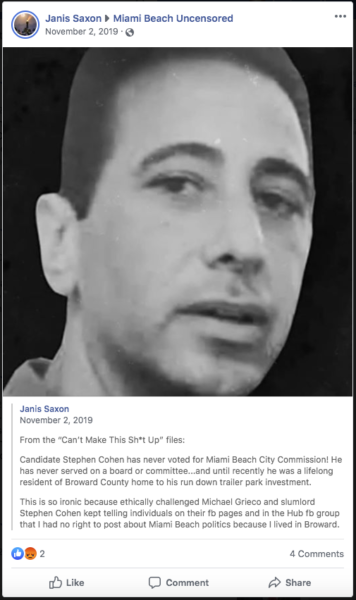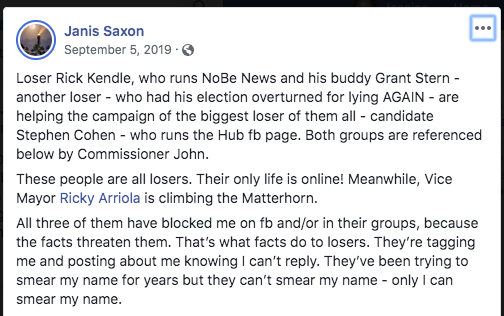For years, the mere mention of the name Janis Saxon has triggered Miami Beach political insiders.
Since late 2015, Saxon has been a recurring presence on social media, where her commentary on local politicians and candidates has cemented her role as a gadfly and rabble-rouser. The fact that she is seemingly ever-present in local Facebook groups yet almost invisible in real life has only intensified her mystique as a kind of modern-day Boo Radley.
Some have speculated that Saxon is a bot or an avatar. Others believe she’s a political actor doing the bidding of Miami Beach Commissioner Ricky Arriola or uber-connected campaign consultant Christian Ulvert. In reality, Saxon is an actual woman, a 59-year-old registered Democrat living in Hallandale Beach. But what — or who — she represents is tougher to decipher.
For the uninitiated: Saxon can be found commenting in local Facebook groups such as Miami Beach Residents and Miami Beach Uncensored. Her posts are frequent and often include links to articles that impugn the foes of the politicians and candidates she supports. Saxon is known for biting back at those who disagree with her by calling them “losers,” “scumbags,” and “lowlifes.” When she posts about the ongoing legal fracas over sexual-assault allegations leveled in 2017 by former Miami Beach City Commissioner Kristen Rosen Gonzalez against twice-defeated commission hopeful Rafael Velasquez, Saxon derisively refers to the situation as “Ding-Dong Gate.”
In the leadup to Miami Beach’s municipal elections this past November, Saxon’s posts grew more frequent — and her critics seemed to have reached a breaking point. State Rep. Michael Grieco, a former Miami Beach city commissioner whose 2017 criminal case has made him one of Saxon’s prime targets, accused her of being a “proxy” for local politicians. Rosen Gonzalez, meanwhile, suggested Saxon has links to Ulvert.
Grieco says he regularly fields questions about Saxon from his constituents.
“Even average, run-of-the-mill residents who are peripherally active in politics, they all know [her],” he says. “I have random people come up to me on the street, like, ‘Who is this person?'”

Screenshot via Facebook
In the aftermath of the most recent city election, Saxon remains a target of speculation. In a lengthy in-person interview with New Times, she denied rumors she is coached by Arriola, Ulvert, or anyone else. Arriola and Ulvert have also denied those accusations.
“I’ve never been paid by a PAC, a politician, a candidate, ever,” Saxon says. “I post only what I feel. No one has ever directed me to do anything.”
In recent years, Saxon has made a handful of small campaign contributions to Miami Beach politicians: $100 to Mayor Dan Gelber in April 2017; ten repeat donations of $20.18 to former mayor Philip Levine’s gubernatorial campaign in 2017 and 2018; and $100 to Arriola this past October.
She says she’s simply a Miami Beach native with a political obsession who has made it her personal mission to uproot those she sees unfit for office.
“I’m the good guy. They’re the bad guy. I’m standing up,” she says.
Saxon, who also uses the name Janis McCray (her surname from a prior marriage), says she and her twin brother were born at Mount Sinai Medical Center in Miami Beach and grew up nearby in North Miami Beach. Her father worked as a motorcycle officer with the Miami Beach Police Department, and her late uncle Arthur Hertz was CEO of Wometco Enterprises, which operated Miami Seaquarium. As an adult, Saxon says, she enlisted in the U.S. Air Force before returning to the Miami area.
Saxon joined Facebook in 2010 and at first appears to have used the site strictly to reconnect with friends from her childhood. In October 2015, she became Facebook friends with Arriola, a Miami Beach business owner who was making his first run for city commission. Shortly thereafter, she began tagging him in her posts about local politics, a topic she had never posted about before.
Saxon tells New Times she did not know Arriola before he became a commission candidate. But she says she connected with his political opinions and the charitable causes he posted about on social media.
“I loved what Ricky was bringing on Facebook,” she says. “I was like, I want this guy to win.”
Saxon, who left the workforce nearly 20 years ago owing to health problems, volunteers at a local hospital and says she sees Arriola as a like-minded person with a heart for charity. On Facebook, she has referred to Arriola as a mentor and a father figure despite the fact he’s several years younger. In person, she backs down slightly from those characterizations, saying he’s simply someone she admires and considers a friend.
“I call him my friend,” she says. “He might not feel that way toward me, but this is how I feel.”
Saxon describes herself as a “volunteer” for Arriola and other past candidates, although she acknowledges it’s a self-appointed title. The way she sees it, she can say things the candidates themselves could never get away with saying.
“They definitely have to maintain decorum,” she says. “They could never post some of the things that I’ve said.”
While Saxon says her posts are not dictated or officially sanctioned by the candidates, she’s adamant that no politician she supports has ever asked her to quit posting.
“No one ever stopped me,” she says. “I just started doing it.”
One of Saxon’s first forays into politics occurred in 2013, when she was introduced to Michael Góngora via Facebook. Góngora — a Miami Beach city commissioner who at the time was running for mayor — says he met Saxon at an event in North Beach and, at first, welcomed her support when she offered to post positive messages about his campaign on social media.
“I was outspent ten to one,” Góngora says of his opponent, Philip Levine, who ultimately won the election. “I welcomed any support that I could get.”
But after losing the election, Góngora says, Saxon continued to call him and his political consultant, Randy Hilliard. Hilliard, who says Saxon called him thousands of times over a six-month period, eventually filed for an injunction for protection against repeat violence, colloquially known as a restraining order.
In his June 2014 petition, Hilliard wrote that Saxon left him messages stating, “I don’t want to hurt you, Randy” and “I will not rest until you are gone.”
Miami-Dade Circuit Judge Deborah White-Labora barred Saxon from contacting Hilliard for six months, court records show. Police property receipts show Saxon surrendered two guns and a handful of bullets as part of the court order.
“I’ve thought about getting another injunction,” Hilliard tells New Times. “She’s continued posting negative stuff about me.”
Saxon says Hilliard “asked [her] to call him each and every time.” And she says she never posed any danger.
“He’s a scumbag liar,” she says. “That man went to court and lied like a bitch.”
Hilliard isn’t the only political insider to accuse Saxon of making threats. Grieco tells New Times he has twice called police after receiving a “veiled death threat” from her.
As Saxon tells it, she received a phone call from a Miami Beach detective after writing “tick tock” in a post about a criminal investigation into one of Grieco’s campaign donors in 2017. Saxon, who denies having threatened physical violence, saw the phone call as a clear form of intimidation — a politician using the city’s police force as his henchmen.
“He abused his power,” she says of Grieco. “He never felt threatened by me by a post that said ‘tick tock.’ He’s a lowlife.”
Saxon says her core mission is to root out corruption within Miami Beach politics. And she defends her posts as “bold” and “honest” even when they’re antagonistic.
“I think I’m perceived as being mean, but really what I’m doing is telling the truth about candidates,” she tells New Times.
But some say Saxon’s social media posts go too far. Rosen Gonzalez, the former city commissioner whom Saxon has repeatedly mocked over her claims of sexual assault by a fellow politician, says she eventually blocked Saxon.
“She refers to my sexual harassment experience as ‘Ding-Dong Gate,'” Rosen Gonzalez says, “which I find really odd and hurtful.”

Screenshot via Facebook
Grieco agrees Saxon’s posts often cross a line. Instead of quarantining their political differences to the Facebook pages designed for that discourse, Grieco says, Saxon has posted invectives on his personal Facebook profile.
“I’ll post a picture of, like, me and my kid, and she’ll attack me,” he says. “That’s where I get upset — where it’s on my personal page. I’ll remove something if it’s just some disgusting comment on one of my family’s stuff.”
Rick Kendle, a longtime Miami Beach resident who keeps tabs on local politics, believes Saxon has targeted him too. After he opposed a development project in a public park a few years ago, he says, fake social media profiles were created in his name and the names of other opponents of the project.
“All of us had fake Facebook pages created in our names, and Google [Plus] pages, revealing, like, personal stuff,” he says. “For me, they revealed that I had a Chapter 11 for a business.”

Screenshot via Facebook
Kendle says he did some detective work and came to suspect Saxon was the culprit. After sending her an email demand to cease and desist, he says, “everything was removed within two hours.”
Saxon denies having created the social media accounts and says she did not even know who Kendle was until the most recent election cycle.
“I never got an email, never, ever created fake profiles,” she says. “I have never in my life made a fake account. I don’t even know if I know how to do it.”
Góngora is one of the few politicians who’s actually met Saxon. But in recent years, he has read her posts with a puzzled skepticism.
“The style of writing seems male to me. It’s a different person than the Janis Saxon I knew back in 2013,” Góngora says. “She posted some things [supporting me], but it was very innocuous. It was not the voice she uses now. At one point, I wanted to ask the question everyone wanted to ask, which is: Who is this, really?”
One prominent theory is that Saxon allows certain candidates or political influencers to use her social media profiles with carte blanche, noting, as Góngora does, that the caustic vibe of her posts doesn’t seem to jibe with her real-life personality. Stephen Cohen, who sparred with Saxon online before losing a city commission bid this fall, is one local who has questioned whether Saxon is the true author of her Facebook posts.
“It cannot be one person, because it’s literally 24/7,” he says.
Saxon denies that claim and says she personally authors everything on her pages from her cell phone — she tells New Times she doesn’t even have a home computer.
“Nobody has ever in my life told me what I should be posting, what subject, what topic, anything,” she says.
Asked whether it’s possible other people might have her login information, she says she has “no clue.” And she claims to have been hacked a number of times by people she believes to be political rivals.
“It’s part of politics,” she says. “It’s something I have to deal with.”
Saxon says that on the occasions she was hacked, she reported the incidents to Facebook and tried to alert her followers what had happened.
Another hypothesis — floated by Rosen Gonzalez, among others — is Saxon is a puppet of Ulvert, a political consultant who has worked for Gelber and Levine.
Ulvert, however, denies ever having worked with Saxon.
“I’m very happy to dispel that,” he tells New Times. “I can tell you unequivocally it’s not me.” (Saxon also denies being in cahoots with Ulvert.)
Arriola too denies having any involvement in authoring or drafting Saxon’s posts. He says he doesn’t consider her anything more than a passionate supporter.
“She’s not my employee. I’ve never paid her. She’s not a volunteer for me or anything like that. I don’t direct her in any way,” he says. “If you want to, sort of think about it as a superfan — somebody a bit overzealous at times in her support of me.”
Though Saxon says she acts independently, she adds that if any of the candidates she has posted about were to ask her to quit, she would respect their wishes.
“I’m volunteering my services, and they have the option to say, ‘No, thank you,'” she says.
Multiple people interviewed by New Times for this story described Saxon’s posts as having a toxic effect on Miami Beach politics.
“This has been going on in this city for literally three to five years,” Cohen says. “It’s literally caused discourse to where people are hating each other.”
Adds Grieco: “It’s a sad way of disrupting and manipulating the electorate.”
But Arriola says he has “no control” over Saxon.
“I can’t rein her in. I don’t control her,” he says. “I don’t know that Stephen Ross at the [Miami] Dolphins is chastising Dolphins fans for their overzealousness even if it rubs people the wrong way.”
Saxon points out she too has been the subject of hatred and vitriol.
“It’s sad. I had no idea people hated me as much as they did because I was posting for Ricky,” she says. “I’m just a little old volunteer that obviously has caused people to get really upset.”
In the past few weeks, as the most recent Miami Beach election has receded further into the past, fewer of Saxon’s posts have been political. But she says she has no intention of retiring from social media.
“They want me to go away,” she says. “And I’m not going away.”

